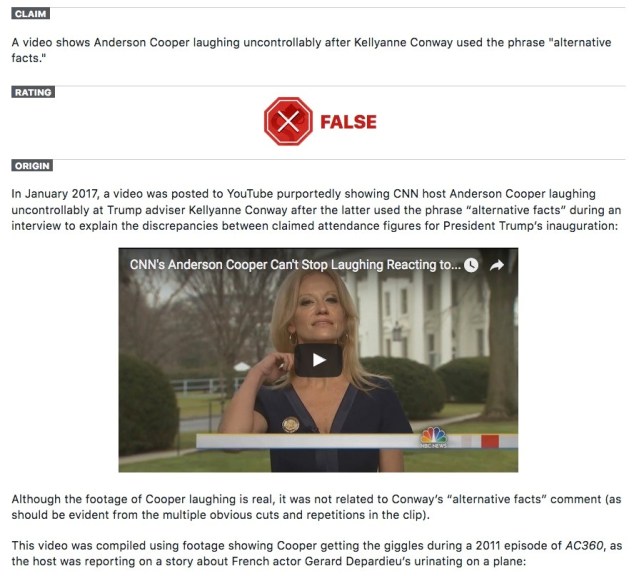Twitter. Facebook. Instagram. Tumblr. All of these social media websites have become one-stop-shops for political rants and ramblings, as well as a bibliography of suspect links. By now, many of us are familiar with the concept of fake news. But how do you know fake news when you see it? That’s where snopes.com steps in.
The dissemination of misinformation is not a new issue plaguing the Internet, but the war against fake news has gained momentum recently. If you’re concerned about the content in the link your grandma shared on Facebook regarding the status of the Affordable Care Act, check Snopes. Snopes is a website founded by David Mikkelson in 1995 and since then has become “a hugely popular fact-checking site which debunks urban legends, old wives’ tales, fake news, shoddy journalism and political spin” (source). Snopes’ main focus is to dispel myths circulating on the Internet and bring context and thorough research to fake and real news alike.
How do you know if you can trust Snopes? Well, according to them:
“The snopes.com web site is (and always has been) a completely independent, self-sufficient entity, wholly owned by its operators and funded through advertising revenues. Neither the site nor its operators has ever received monies from (or been engaged in any business or editorial relationship with) any sponsor, investor, partner, political party, religious group, business organization, government agency, or any other outside group or organization.
David Mikkelson’s participation in U.S. politics has never extended beyond periodically exercising his civic duty at the ballot box. As FactCheck confirmed in April 2009, David is a registered independent who has never donated to, or worked on behalf of, any political campaign or party. David is wholly apolitical, vastly preferring his quiet scholarly life in the company of his cats and chickens to any political considerations (source).”
However, if you are a conscientious consumer of information, you probably will not solely rely on what snopes.com has to say about itself. In that case, look to The Guardian, The New York Times, and the many other news outlets that have praised Snopes for the work it has done and continues to do.
On a personal note, I enjoy frequenting the Fact Check section on snopes.com. I try and look at every story they have written about, whether it’s familiar to me or not. As a librarian, one of the greatest tools in my arsenal is being aware of what is going on in the news and the world and having an informed opinion.
As always, use your best discretion when reading articles online but when you’re in doubt, try Snopes.
Still have questions about fake news? Check out our Fake News Libguide for more sources.


Today’s post was written by Librarian-in-Residence Rachel Deras.

You must be logged in to post a comment.